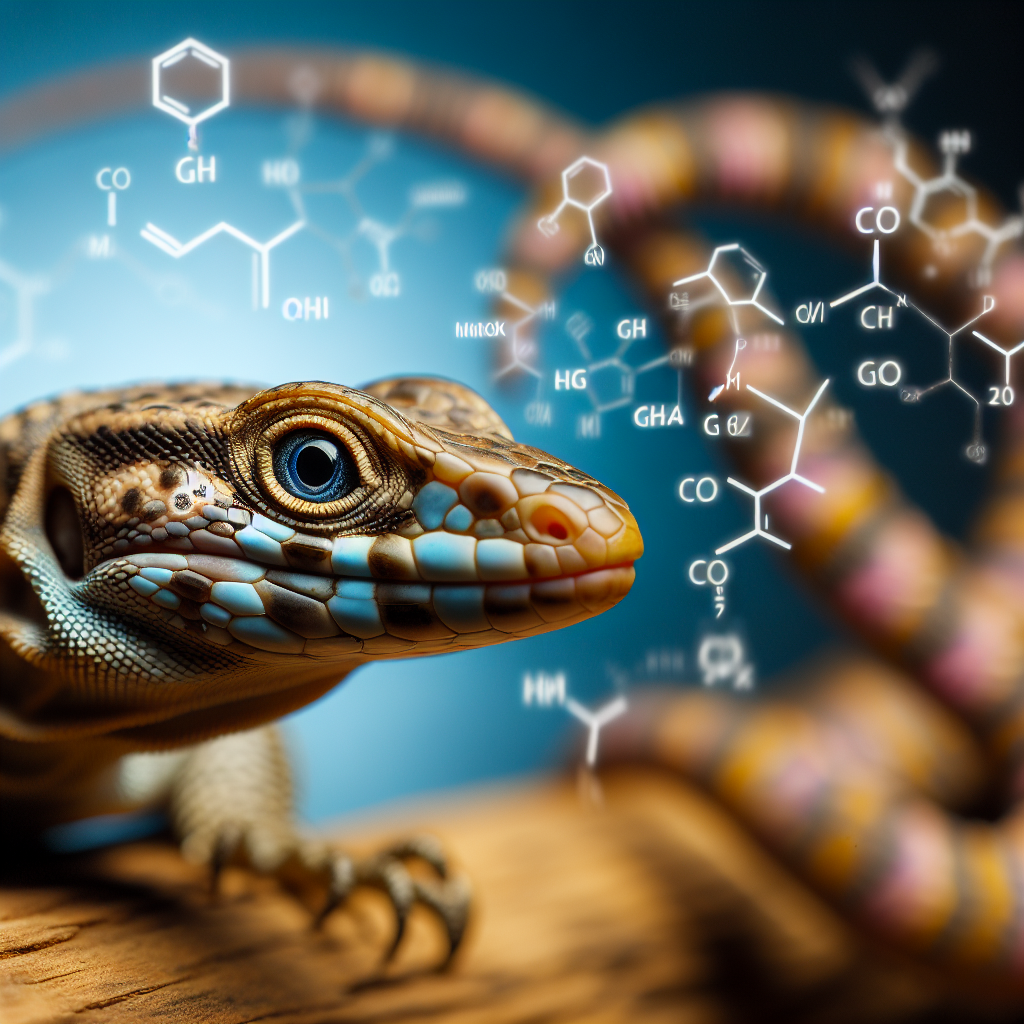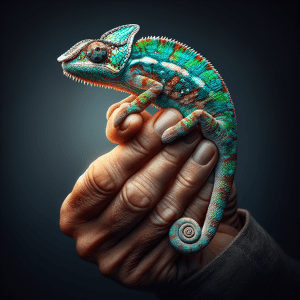Introduction: Understanding the Importance of Recognizing Signs of Illness in Lizards
Have you ever wondered how to tell if your lizard is feeling under the weather? It’s not always easy to spot the signs of illness in these fascinating creatures. From behavioral changes to physical symptoms, there are several clues to watch out for. Let me share a personal anecdote that highlights the importance of being vigilant when it comes to your lizard’s health. A few years back, I noticed that my bearded dragon was acting more lethargic than usual. Initially, I brushed it off as just a mood swing, but when he stopped eating, I knew something was wrong. That experience taught me the value of being proactive in monitoring my lizard’s well-being. Did you know that lizards are masters at hiding signs of illness? They have evolved to conceal weakness as a survival instinct, making it challenging for pet owners to detect when something is amiss. This natural behavior can make it even more crucial to pay close attention to any subtle changes in your lizard’s behavior or appearance. By staying observant and seeking veterinary care at the first sign of trouble, you can ensure your scaly friend stays healthy and happy. So, next time you spend time with your lizard, keep an eye out for any unusual behaviors or symptoms – your keen observation could make all the difference in their well-being.
Common Health Issues in Lizards
When it comes to recognizing signs of illness in lizards, understanding common health issues is key. Did you know that lizards are masters at hiding symptoms when they’re sick? It’s like they’re playing a sneaky game of hide-and-seek with us lizard parents. But don’t worry, I’ve got some insider knowledge to help you crack the code. Let’s dive into the fascinating world of lizard health together.
One of the most common health issues in lizards is respiratory infections. These sneaky bugs can creep up on your scaly friend without warning, causing breathing difficulties and lethargy. Keep an eye out for any wheezing or open-mouth breathing – those are red flags that something’s not right in lizard land.
Now, let’s talk about behavioral changes. Just like us, lizards can show mood swings and personality shifts when they’re feeling under the weather. Have you noticed your usually active lizard becoming unusually lethargic? That could be a sign that they’re feeling a bit off. Pay attention to any changes in their normal routine – it could be your lizard’s way of telling you something’s up.
Remember, being a lizard parent comes with its challenges, but with a little know-how, you can ensure your scaly friend stays happy and healthy. So keep an eye out for those subtle signs, and your lizard will thank you with many more years of slithery companionship.
Behavioral Changes as Indicators of Illness
When it comes to recognizing signs of illness in lizards, paying attention to their behavior is key. Lizards are pretty good at hiding when they’re not feeling well, so we have to be detectives and look for subtle clues. One time, I noticed my bearded dragon, Spike, was less active than usual. He usually loved basking under his heat lamp, but that day, he seemed lethargic and disinterested. That was my cue that something might be off with him. It’s crucial to observe your lizard’s behavior regularly to pick up on any changes that could indicate illness. Remember, lizards can’t tell us when they’re not feeling well, so we have to rely on non-verbal cues. Have you ever noticed your lizard acting differently? Maybe eating less, being more agitated, or displaying unusual movements? These could all be signs that your scaly friend needs attention. By being attuned to your lizard’s behavior, you can catch potential health issues early and ensure they get the care they need. Stay vigilant, and don’t hesitate to consult a veterinarian if you have any concerns about your lizard’s well-being. Your keen observation skills could make all the difference in keeping your lizard happy and healthy for years to come.
Physical Symptoms to Watch Out For
Have you ever noticed your lizard acting a bit unusual? Maybe they’re not as active as usual or refusing to eat. These behavioral changes could be subtle signs that something isn’t quite right in their world.
Imagine this – your lizard, typically a voracious eater, suddenly turns their nose up at their favorite meal. It’s like they’ve become a picky eater overnight! This could be a red flag that they’re feeling under the weather.
It’s fascinating how lizards communicate their distress through their actions, isn’t it? These little creatures may not be able to speak our language, but they have their unique ways of showing us when they’re not feeling their best.
Recognizing these physical symptoms can be crucial in catching any health issues early on. Keep an eye out for changes in skin color, difficulty breathing, or any lumps and bumps that weren’t there before. These signs could indicate a potential health problem that needs attention.
Remember, prevention is key when it comes to keeping your scaly friend healthy and happy. Making sure their habitat is clean, providing proper nutrition, and regular vet check-ups are all part of being a responsible lizard parent.
So, next time you notice your lizard acting a bit off, don’t brush it off as just a bad day. Pay attention to their behavior and physical cues – your keen observation could save their life!
Environmental Factors that Impact Lizard Health
Imagine you’re a lizard whisperer, decoding their mysterious world of health. Let’s dive in!
Lizards are masters of disguise, masking their illness with stealth and cunning. But fear not, vigilant lizard parent!
Keep a keen eye on your scaly friend for any sudden changes in behavior. They may be trying to tell you something!
From decreased appetite to lethargy, these are red flags that your lizard might be feeling under the weather.
Did you know that lizards are highly sensitive to their environment? Even subtle changes can impact their health.
Regular health check-ups are crucial for catching issues early. Prevention is key to a happy, healthy lizard life!
In emergencies, swift action is vital. Knowing when to seek veterinary care could save your lizard’s life.
Want to be a lizard health hero? Maintain a clean habitat, provide proper nutrition, and offer plenty of UV light.
Monitoring your lizard’s health doesn’t have to be daunting. A little observation each day goes a long way.
So, are you ready to embark on this fascinating journey into the world of lizard wellness? Your scaly companion will thank you!
Importance of Regular Health Check-ups
Have you ever noticed your lizard acting a bit off? It’s crucial to pay attention to any behavioral changes. Maybe your little reptile buddy isn’t as active as usual. That could be a red flag right there. Lethargy in lizards is often a sign that something’s not quite right in their world. Watch out for any changes in appetite too. If your lizard suddenly loses interest in mealtime, it’s time to take notice. These little guys are usually eager eaters, so a loss of appetite is a big deal. Another thing to keep an eye on is their skin condition. Rough, dull, or discolored skin could indicate an underlying health issue. And let’s not forget about their eyes! Bright, clear eyes are a good sign, but any cloudiness or discharge could mean trouble. Now, I know it can be a bit nerve-wracking to spot these signs, but don’t panic. Remember, early detection is key to getting your lizard the help they need. So, next time you’re hanging out with your scaly friend, take a moment to observe their behavior and appearance. It could make all the difference in their well-being.
Emergency Response: When to Seek Veterinary Care
When it comes to recognizing signs of illness in your lizard, timing is key. You know your scaly friend better than anyone. So, pay attention to any changes in behavior or appearance. Trust your gut—it’s usually right. Remember, prevention is the best medicine. But, if things seem off, don’t hesitate to seek professional help. Sometimes, it’s better to be safe than sorry. Your lizard can’t tell you when they’re feeling under the weather. That’s where your keen eye comes in. Think of yourself as a lizard detective, solving the mystery of their health. Keep a close eye on their eating habits, activity levels, and overall demeanor. It’s like playing a game of “spot the difference,” but with your pet’s well-being on the line. Don’t wait until it’s a full-blown emergency. Catching issues early can make all the difference. Remember, you’re their guardian and advocate. Your lizard relies on you to keep them happy and healthy. So, keep your detective hat on and watch for any red flags. Your vigilant care could be a lifesaver for your scaly companion.
Preventative Measures to Keep Your Lizard Healthy
Have you ever wondered how to ensure your lizard stays in tip-top shape? Well, let’s delve into some practical tips for monitoring and maintaining your scaly friend’s health.
First off, it’s crucial to establish a regular routine for observing your lizard’s behavior and physical condition. This can help you pick up on any subtle changes that may indicate underlying health issues.
Keep an eye out for any changes in appetite, activity levels, or interactions with their environment. These behavioral cues can often be your lizard’s way of communicating that something isn’t quite right.
When it comes to physical symptoms, pay close attention to their skin, eyes, and overall body condition. Any unusual lumps, bumps, or discolorations should raise a red flag and prompt a closer inspection.
A handy tip is to maintain a health journal for your lizard, noting any observations, feedings, and interactions daily. This journal can serve as a valuable reference point for tracking patterns and changes over time.
Remember, prevention is key. Ensure your lizard’s habitat is clean, well-maintained, and provides the necessary heat, humidity, and lighting for their optimal health.
By staying proactive and attentive to your lizard’s well-being, you can help them lead a long and healthy life as your beloved reptilian companion.
Tips for Monitoring and Maintaining Lizard Health
Have you ever wondered how to ensure your lizard stays healthy and happy for years to come? Monitoring and maintaining your lizard’s health is crucial for their well-being. One practical tip is to establish a routine health check-up schedule. Regular check-ups can help you detect any potential issues early on. This can include physical exams, blood tests, and fecal analyses. By staying proactive, you can address any health concerns promptly and prevent future complications. Think of it as preventive care for your scaly friend. It’s like giving them a clean bill of health every time they visit the vet. Plus, it’s an opportunity to bond and show your lizard some extra love and attention. So, why not make it a fun outing for both of you? You could even reward them with their favorite treat afterwards. Remember, a little TLC goes a long way in keeping your lizard healthy and thriving. After all, a happy lizard equals a happy lizard parent!
Conclusion: Promoting Wellness in Your Pet Lizard
Ever wondered how to decode the mysterious language of lizard health? It’s like cracking a secret code.
Let me share a personal anecdote: I once had a pet lizard named Spike. One day, Spike started acting strangely.
His normally voracious appetite vanished, and he seemed lethargic. I was puzzled and worried.
After some research and consultation with a reptile expert, I learned that these were signs of illness in lizards.
Understanding these subtle cues is crucial in ensuring your scaly friend’s well-being.
Lizards, despite their tough exteriors, can be quite delicate creatures when it comes to health.
One interesting fact to note: Lizards are masters of disguise when it comes to hiding illness symptoms.
This challenge of deciphering their signals adds an element of mystery to lizard care.
So, how can you navigate this enigmatic world of lizard health? Stay tuned for expert advice and practical tips.
Remember, being proactive in monitoring your lizard’s health is key to preventing serious issues.
Join me on this fascinating journey of unraveling the signs of illness in lizards. Let’s dive in!



